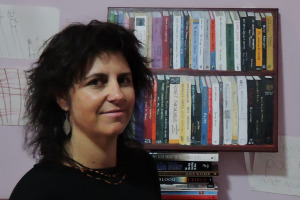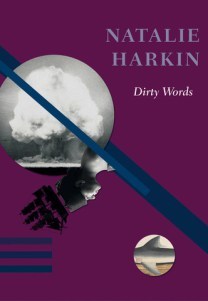Poet Natalie Harkin on writing Dirty Words
NAIDOC Week to me is about celebrating all that is good in our communities. As a writer, the role of storytellers in that celebration is paramount. With that in mind, I’m thrilled that after some years of coaxing I finally have the deadly poet Natalie Harkin as a guest at my blog.
Natalie is a Narungga woman, a proud member of the Chester family from Point Pearce in South Australia. She has worked in the Aboriginal higher education sector in South Australia since the mid-1990s, and is currently a Lecturer and Academic Advisor with Yunggorendi at Flinders University. Her current Phd research is an archival-poetic journey through the State’s Aboriginal family archives. It weaves together a love of storytelling, activism and resistance-poetics through art and literature, and Aboriginal writers and artists who engage critically with State record.
She has been an active member of the local South Australian Aboriginal and Torres Strait Islander Storytellers and Writers Group, a member of the First Nations Australia Writers Network, and has shared her poetic-prose at conferences, local events and festivals, including a workshop with the 2014 International Writers Festival, Ottawa.
Today, Natalie has kindly answered a few questions I had about her recently released collection of poetry Dirty Words.
Dirty Words is an A-Z index of poetry that is your own ‘small contemplation on nation and history’ acting as a ‘note to self’. When did you start writing this ‘note’ and what compelled you to do so?
Every day current affairs is fodder for satire and rage. It’s hard to listen to the news, and sometimes I have to write it out. This collection began in 2013, responding to issues important to me and my family, and was inspired by Quo-li Driskill’s brilliant poem (Auto)biography of Mad, from the Sovereign Erotics collection of Two-Spirit literature. The early title was ‘A-Z Index of Dirty Words and Colonial Absurds’, so when Cordite asked me last October if I had a body of work to publish, this dodgy very-draft collection had to be it – it felt ‘timely’. I’m a reluctant publisher, but this ‘note to self’, to speak up and be brave in times like these, is a lesson from so many activists and leaders and friends I admire. I’m grateful to Cordite for the opportunity and support.
‘Domestic’ is a very powerful piece about the compulsory service young Aboriginal girls were placed in under the Aborigines Protection Act. What, if any of this is poem is personal to you?
Both my Nanna and Great-grandmother were domestic servants under the Aborigines Protection Act and the Children’s Welfare Department, and their placements were meticulously documented by the State. Some of the quotes are taken from a 1920’s women’s magazine, The Australian Woman’s Mirror, selected from articles and anecdotes submitted by white women about their “Abo servants”! Other quotes are taken from the 1913 Royal Commission into Aborigines in SA, honing in on some statements recommending the removal of young girls from their families at Point Pearce, specifically for domestic service. These records expose deep-seated racism at the heart of policy-making and race-relations in Australia at the time, that can be traced forward to today, and I love the transparency of it all in the archives. But it’s pretty chilling, particularly when you know the direct impacts on your own family. Some of the words are also taken from my Nanna’s records, and the shorter poem Apron Sorrow was written for my friend and artist Yhonnie, who made two linen aprons and hand blown glass bush plums tucked in the apron pockets; a work dedicated to her own nanna and great-aunt who were also domestic servants at the same time as mine.
In ‘Resistance’ you mention a number of storytellers – Aunty Irene, Aunty Vi, Aunty Doreen, Aunty Veronica, Aunty Elaine, Aunty Charlotte. You’ve been blessed also with the ‘storyteller’s gene, but what does it mean to you as a writer to have this gift?
These beautiful, strong and proud women had a great influence on me, particularly from my early 20s when I started visiting the old Point Pearce mission station with my Nanna. They also shaped my activism from the early 1990s as I spent nearly a decade campaigning against the Hindmarsh Island bridge, and supporting community through multiple inquires including a Royal Commission into women’s spiritual beliefs. I began writing it when they were all still alive, a decade ago, by way of expressing my love and gratitude for them. It was originally called ‘Ode to the Women’, and was inspired by an Alice Walker poem called These Days. It was also part of an exhibition at Tandanya for the Spirit Festival in 2011. I didn’t include it in Dirty Words originally, but I’m glad I decided to put it in under ‘R’, because for me it became the heart and soul of the collection. There are incredible stories from the men in my family too. My pop wrote poetry to his mum when he escaped from being a POW in WW2. One great-grandfather was a child miner who helped start the union movement in Broken Hill, and another was active in writing petitions and letters to the Aborigines Protection Board against child removal laws, and for better conditions on the Mission. I’m not a natural storyteller, but writing is a kind of therapy.
Words like Sovereignty, Treaty, and Land Rights are still considered ‘dirty words’ in Australia based, I think, on misinformation, ignorance of our history, and also thanks to the media maintaining old myths like ‘the Aboriginal problem’. I just wanted to gather a few of these words and play with them a bit to find their connections. The original draft was huge – there’s so much dirt out there! The same week the final edits were done, Abbott came out with his ridiculous inflammatory ‘Lifestyle Choices’ comment, which would have been perfect to respond to. But every day there is a new dirty word – I had to draw the line.
What are you reading right now?
I just started reading The Chicken Chronicles by Alice Walker, because my kids got me four baby chicks for my birthday that are living in our lounge-room until they’re big enough for the chook-yard. This is such a poignant, insightful and funny memoir, a blog-style account of her love affair with chickens – a great bedtime read for chook-lovers!






